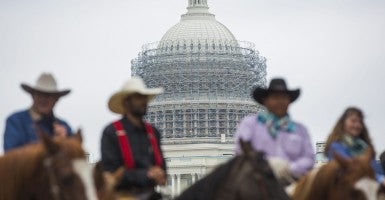Grant Gerber, a longtime Nevada rancher, attorney and land-rights activist, died last Saturday from injuries sustained during his cross-country ride in the Grass March on Washington, D.C.
Earlier this month, Gerber, a 72-year-old county commissioner of Elko County, Nev., who earned a Bronze Star in Vietnam, led a group of ranchers and grassroots activists on horseback from the Pacific coast to Capitol Hill to draw attention to the Bureau of Land Management’s regulation of public and privately owned lands in the West.
>>> From California to D.C., These Cowboys Rode in Protest of Government Land Grab
Midway through the trip east, Gerber suffered a head injury when his horse stumbled into a prairie dog hole and fell. After experiencing headaches during his trip back to Nevada, Gerber was seen by doctors in Wyoming who discovered internal bleeding. He underwent surgery last week at a hospital in Salt Lake City and died there two days later.
“He was a man of true colors and he died with his boots on,” Nevada state assemblyman John Ellison told the Elko Daily Free Press.
According to the Elko Daily, Gerber began championing states’ rights nearly four decades ago “when Congress began to designate the nation’s first wilderness areas.”
“He was an original Sagebrush rebel,” R.J. Smith, a distinguished fellow at the Competitive Enterprise Institute’s Center for Energy and Environment, told The Daily Signal.
The Sagebrush Rebellion had begun in Nevada and a small number of other western states following the passage of the Federal Land Policy Management Act in 1976, Smith said. By 1979, Nevada and four other states had passed resolutions calling for return of federal lands to the states.
Smith said Gerber was one of the earliest to focus on protections for private property rights on public lands in the West and to call for continuation of multiple-use policies on the federal lands.
Over the years Gerber fought against the expansion of federal land, government abuses associated with enforcement of environmental legislation such as the Endangered Species Act, and, most recently, the BLM’s grazing restrictions, which severely hampered ranching families throughout Nevada, Smith said.
At one point in his career, Gerber helped produce Big Park, a music video famous in the property rights movement that underscored abuses of the National Park Service in taking private property to create parks.
According to Smith, Gerber brought “clarity and focus and respect to the cause of individual liberty and the unalienable rights of life, liberty and property and [drew] attention to how the government was growing ever more tyrannical towards private ownership of land and resources and towards private rights in federal lands, such as water rights and property rights.”
Just a couple weeks before his death, Gerber delivered petitions signed by ranchers and landowners from counties in Kansas, Utah and Nevada to members of Congress in his latest crusade against the government’s sweeping land ownership in Western states.
According to his son, Travis, Gerber, a father of six with 26 grandchildren, was surrounded by family when he died Saturday evening.
“Elko County lost one hell of a freedom fighter, a torchbearer for freedom,” said Elko County Commission Chairman Charlie Myers, who served with Gerber on the board of commissioners. “I don’t know who picks up that torch and carries it because he was certainly a freedom fighter that is going to be almost impossible to replace.”
































